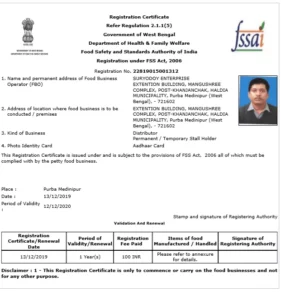FSSAI is the organization that is responsible for the registering licenses of every food business operator (FBO) in India thereby regulating quality checks of food products and restricting the food adulteration and sale of substandard products. It lays down the rules and regulations for carrying food business in India and ensures the protection of public health. For those who are dealing with food-related businesses, they must have an FSSAI Registration certificate.
Anyone starting a food business is required to follow FSSAI rules and regulations. According to the FSS Act, every food business operator involved in the manufacturing, processing, storage, distribution, or sales of food products in the country must be registered or licensed under the FSSAI. The 14-digit registration number of the food license which will be printed on the food packages or displayed on-premises gives data about the producer’s permit and suggests the legal certification. Setting the standards and principles of food safety, FSSAI ensures and promotes the welfare of food businesses in India

To get this certificate, you must register with the Food Safety and Standards Authority of India (FSSAI). FSSAI operates under the Ministry of Health & Family Welfare, which is part of the Government of India. Established through the Food Safety and Standards Act, 2006, the FSSAI ensures that food businesses meet safety and quality standards.
The terms FSSAI Certificate and FSSAI License refer to the same thing. Both ensure that the food you produce is safe, pure, and trustworthy for your customers.
For more details, visit bharatlicenseexpert.com and get your food license today!
The Food Safety and Standards Authority of India (FSSAI) strictly monitors food production and processing. Under the FSSAI Act 2006, Sections 50 to 65 outline offenses related to food safety. It is important to follow all the rules to avoid penalties.
If you sell food without an FSSAI license, you could face imprisonment and a fine of up to ₹5 lakhs. So, it’s important to get your FSSAI registration done on time.
For easy and hassle-free registration, visit bharatlicenseexpert.com and secure your food license today!
Submit these documents easily with bharatlicenseexpert.com and get your FSSAI License without any hassle!
Trust of the Customers
Having an FSSAI certificate assures your customers that the food you provide is safe and follows government standards. It builds customer trust and loyalty.
Legal Advantages
With an FSSAI license, your business is legally compliant. This protects you from legal issues and penalties that can arise from operating without a license.
Government Funding and Loans
Businesses with an FSSAI certificate can easily apply for government loans or funding schemes that are specifically available for licensed food businesses.
Use of FSSAI Logo
The FSSAI logo on your product packaging gives a professional look and assures customers that your food meets safety standards, enhancing your brand’s credibility.
Brand Value
An FSSAI license increases your brand value. It shows your commitment to safety and quality, making your brand more appealing to customers and partners.
Expansion of Business
With an FSSAI certificate, it becomes easier to grow your business, expand into new markets, and gain more opportunities both locally and internationally.
Recognition of Government
The FSSAI certificate provides official recognition from the Government of India, giving your business credibility and trustworthiness in the food industry.
Permit of Food Business
An FSSAI certificate is mandatory for running a food business. It gives you legal permission to manufacture, sell, and distribute food products in India.
Benefits from Government Actions on Non-Compliance
By having an FSSAI certificate, your business stays protected from fines or penalties during government inspections for food safety compliance.
Boost Up Your Business
The FSSAI certificate helps your business grow faster by giving it a competitive edge. It opens doors to new opportunities and partnerships.
Basic FSSAI Registration (For Small Businesses)
State FSSAI License (For Medium-Sized Businesses)
Central FSSAI License (For Large Businesses)
The validity of an FSSAI license ranges from 1 to 5 years, based on the option you select when registering your food business.
Running a food business without a valid FSSAI license is illegal. If you don’t comply, you may face fines, business closure, or legal trouble.
No, FSSAI registration is only for the person or business that applied for it. It cannot be transferred to someone else.
For more information and help with your registration, visit bharatlicenseexpert.com!
Getting your FSSAI registration is not just a legal requirement; it also brings many advantages for your food business:
Consequences of Non-Compliance
If you are registered under FSSAI, you must follow the rules of the FSS Act, 2006. Food safety officers will inspect your business to check if you comply with the regulations. They use a checklist to mark your compliance level as:
Compliance (C)
Non-compliance (NC)
Partial Compliance (PC)
Not Applicable/Not Observed (NA)
If there are any issues, the officer may issue an improvement notice as required by Section 32 of the FSS Act, 2006. If you do not follow the notice, the officer can cancel your license after giving you a chance to explain. If you disagree with the notice, you can appeal to the State Commissioner of Food Safety. You can further challenge the decision at the Food Safety Appellate Tribunal or the High Court.
For easy FSSAI registration and support, visit bharatlicenseexpert.com !
FSSAI Registration is a basic license needed for all small-scale food businesses. This includes:
Other food businesses that are not small-scale need to get an FSSAI license. There are two types of FSSAI licenses based on the size of the business: State FSSAI License and Central FSSAI License.
The license can be issued for a period ranging from a minimum of 1 year to a maximum of 5 years.
For more information and assistance with FSSAI registration and licensing, visit bharatlicenseexpert.com!












The FBOs carrying on the following kinds of business are mandatorily required to obtain an FSSAI Registration/License:
According to the FSSAI Act, 2006 all food businesses are required to be registered/licensed under the following 3 categories:
It is the primary kind of registration issued for businesses that are small in turnover – up to? 12 lakhs approximately per annum. Catering businesses irrespective of their turnover have to apply for a state license and not a basic FSSAI registration.
Companies that have a profit greater than? 12 lakhs require an FSSAI state license.
The central registration is for bigger businesses that have a turnover of over. 20 crores per annum. Companies that supply food to government offices/departments and businesses involved in food import/export, an online platform, operating franchises, or chains of hotels/restaurants have to get a Central FSSAI license as well.
Based on the different types of registration and the food business that you are running, you have to submit different documents required for FSSAI Registration.
Including the documents required for FoSCoS FSSAI Registration, manufacturing units have to submit the following documents as well:
FSSAI stands for the Food Safety and Standards Authority of India. It is a regulatory body under the Ministry of Health & Family Welfare, Government of India, responsible for ensuring the safety and quality of food products.
FSSAI Registration or license is a mandatory requirement for food businesses operating in India. It ensures that food products comply with the standards set by FSSAI, thereby ensuring consumer safety.
Any entity involved in the manufacturing, processing, packaging, storage, distribution, and sale of food products needs to obtain FSSAI registration or license.
There are three types of FSSAI registrations/licenses: FSSAI Basic Registration (for small-scale food businesses) FSSAI State License (for medium-sized food businesses) FSSAI Central License (for large-scale food businesses)
You can apply for FSSAI registration/license online through the FSSAI portal by filling out the required application form and submitting the necessary documents.
The documents required may vary depending on the type of registration/license you are applying for. However, common documents include identity proof, address proof, proof of possession of premises, food safety management plan, and others.
The validity period of FSSAI registration/license varies: FSSAI Basic Registration: 1 to 5 years FSSAI State License: 1 to 5 years FSSAI Central License: 1 to 5 years
Operating without FSSAI registration/license is illegal and can attract penalties, which may include fines, closure of the business, and imprisonment.
No, FSSAI registration/license is non-transferable. If there is any change in ownership or location, a fresh application needs to be made
Yes, online food businesses are also required to obtain FSSAI registration/license, irrespective of whether they operate from a physical location or not.
WhatsApp us